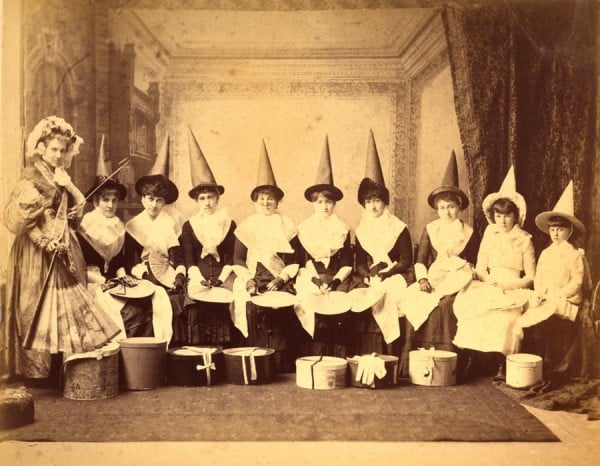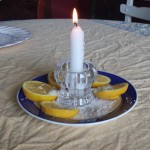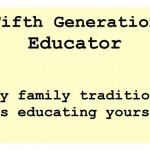
This is the second in my series on being a Pagan teacher; in the first one, I talked a little about how to be an effective teacher. Today, I want to talk about different models of teaching and their uses.
Let me begin by reiterating that I teach for my day job. I have also experienced the workshop/classroom model for teaching Pagan and witchcraft topics as both a teacher and a student and I received my Faery training under an apprenticeship type one-on-one model, and have taught my own students in a combination of apprenticeship and coven teaching depending on what was going on at the time.
The classroom or workshop model
Fundamentally, this means that you have a number of students and one or two teachers, and the relationship between teacher and student is limited in time and space. That is, they interact mostly in the classroom setting, with a variable amount of individual consultation outside of it, and once the term of the class is ended there is no presumption of a relationship beyond that.
The classroom model is good for imparting mainly intellectual information, or specific skills that can be practiced within the constraints of the course. It is also an efficient way to maximize resources…either in terms of making sure more people get access to a particular teacher or (if the teacher is being paid) ensuring that the teacher gets a reasonable wage at an equally reasonable rate of tuition for the students.
The classroom structure inherently creates more of a hierarchy than the other types, relatively speaking. This in itself is neither good nor bad, but is a tendency to be aware of, especially if your stated values are otherwise. The frequent internal fights I witnessed in Reclaiming about who was or was not deemed a “teacher”…and who got paid…I believe are traceable in part to the structurally hierarchical tendencies of workshops and Witch Camp straining against the anti-hierarchical sensibility of the tradition as a whole. A classroom model also creates emotional distance, which is useful to me as a college instructor, but as a means of teaching emotionally intense spiritual subjects may be counterproductive.
Apprenticeship
An apprentice is something like a student and something like an assistant; learning comes from both discussion and practice, often in partnership with the teacher, and it easily (almost inevitably) spills over into a personal friendship. This approach is generally far less structured, which can be both an advantage and a disadvantage. The down side is that sometimes major topics get skipped because they just didn’t happen to come up; the up side is that the practice is very much integrated into daily life and the student sees the teacher’s practice in action, not just in theory or by self-report. This is the most supportive form of the teacher-student relationship, and that level of support is essential for some of the shamanic and ecstatic types of practice. It is also the most time-intensive, on both the student and teacher’s part.
Teaching in covens
In practice this is often a combination of the two, both structurally and in a kind of linear progression; that is, a coven may have “outer court” classes which are taught by coven members to a group, then as students advance they wind up working with a teacher one-on-one. In a tradition like Faery where there is only one initiation and several initiates may be part of a coven, each initiate may have a student under his or her supervision for individual work combined with group ritual and other activities. Ideally coven-teaching is the best of both worlds; in practice I could see the potential for screwed-up interpersonal dynamics finding a foothold or being exacerbated. I will say that in my own personal experience that for any witchcraft beyond the most basic “this is how to cast a circle, here’s the Wheel of the Year, let’s talk about directions and elements” kind of information, the closer the teaching model is to apprenticeship, the more functional it tends to be. There also needs to be a clear path forward for students, and a clear understanding of who is responsible for what.
Generally speaking, the more intellectual and dry the information you are conveying, and the less expectation you have of any relationship beyond the term of the course, the better a classroom or workshop model will suit. The more intense and volatile the training, the more an apprenticeship or coven model is necessary; this is why the principles listed on the Faery Tradition website include “We recognize that Faery is highly transformative and extremely experiential, requiring closer attention and responsibility than workshops, seminars, or intensives provide.”
From both the teacher and student’s perspectives, knowing what your goals are (both short term and long term) is vital. How much support and attention from the teacher do you need/are you able to give? I have seen people struggling with the emotional fallout of practices learned via a book or a relatively inaccessible workshop teacher, sometimes to their detriment; in my own experience I have found that approach too ungrounded for anything energetically intense. There are also potential pitfalls for the teacher: in an interview for the article “The Teacher Will Appear” by Christine Hoff Kramer and Sierra Black which appeared in Witches and Pagans #25; I made the observation that “in group situations people are much, much more likely to project their shadow stuff onto me than they are in situations where we have a more organic and personal relationship.” Obviously, I don’t think a classroom model is inherently bad; I teach in a classroom every week. I have also given my share of Pagany workshops and talks. I do think that for both teacher and student understanding the limits and advantages of a given approach will help to avert difficulties and make sure the education you are seeking happens.












